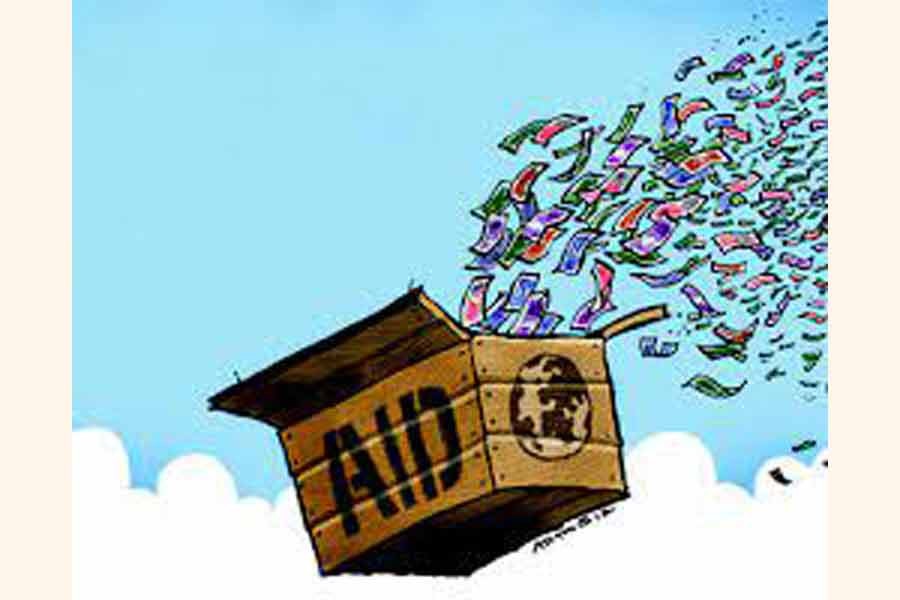Development aid is one of the most important policy tools that rich countries have for transferring resources to help poor ones. Between 1960 and 2013, OECD countries gave US$3.5 trillion (in 2009 dollars) of official development assistance (ODA). Approximately $568 billion (in 2003 dollars) went to African countries.
But the efficacy of ODA is a source of much controversy. Former World Bank economist William Easterly and the Nobel laureate economist Angus Deaton separately argue that aid has failed to drive continued improvements in poor countries, and may even have made conditions worse. Going further, the economist Dambisa Moyo contends that aid has merely increased developing countries' dependence on foreign assistance.
These and other critics worry that the availability of foreign aid might reduce recipient governments' incentives to improve their countries' own institutions. Because aid money can be - and often is - stolen by those in power, it can fuel corruption, or be used by armed groups to sustain violent conflicts. And to the extent that aid intensifies competition for scarce human-capital resources like doctors, nurses, and teachers, it can hinder the development of state capacity.
There is a common thread running through stories of failed aid. In each case, money and services are either given as transfers to the ruling government or delivered by way of NGOs and other groups with no relationship to the government.
In principle, a government should know better than foreign institutions what its country needs, and it should be able to minimize the cost of aid implementation by leveraging existing infrastructure for service delivery. Moreover, transferring resources to a sitting government is the most straightforward mode of delivery for donors. The problem with this option, of course, is that it assumes that the government is efficient and well-intentioned. Rarely are both conditions satisfied in poor countries.
NGOs, by contrast, can deliver aid directly to the people on the ground, and have been shown to be more effective in supporting the poor and needy in places where no other help is available. But NGOs that operate in such environments often do not coordinate with the government, which hampers the development of state capacity in poor countries. NGOs sometimes waste resources by replicating government services or, worse, compete with the government for scarce resources, such as by "poaching" skilled personnel from the public sector. When NGOs are known to offer better salaries than governments, they can create a local "brain drain."ODA thus faces a dilemma. While governments in poor countries generally lack the motivation or capacity to administer aid effectively, sustainable development cannot happen without a country's own government being involved.
Rich countries have a choice. They can abandon the long-run goal of positioning poor countries for self-sustaining development and redefine aid as a continuous effort to improve the lives of the poor. Or they can change the short-run mission to focus on investments in state capacity, targeting the weak governments rather than the "end users." If successful, the latter approach could create the conditions for sustained development over the long term.
To see how, note that government or state capacity refers to the ability to deliver services to the population. Aid workers would focus on providing government workers with tools and training to achieve that end. Development economists have identified a number of tools with proven records of success, including biometric markers or digitized invoices to reduce theft; time-stamped photos to reduce absenteeism of service providers; campaigns encouraging citizens to monitor their local leaders; top-down audits to reduce local corruption; and local elections to hold officials accountable.
Explicitly emphasising the development of local capacity would represent a stark departure from the current approach. Not only does it shift the focus of the work, but it also dispenses with lofty political or ideological objectives, such as tying aid to democratization. We should know by now that radical political change is difficult to achieve, let alone sustain over time. It is time to do away with this Cold War-era strategy. Politicising aid does not promote development. When ODA becomes associated with a foreign political agenda, it can quickly lose effectiveness, by squandering the trust of the intended beneficiaries.
A capacity-centred strategy requires two pre-conditions. First, recipient governments need to be motivated, and the country needs at least a minimal degree of political stability. Making aid conditional on government cooperation can help to align incentives. If there is too much instability, political leaders will see no good reason to invest in bureaucratic infrastructure.
Second, the recipient regime must not be malicious. Increased bureaucratic capacity enables a state to impose its will more efficiently on the people, which implies risks as well as potential benefits.
The government can use it to expand access to schools, medicine, and clean water, or to engage in political repression or genocide. Donor countries will need to be vigilant when deciding which governments are worthy of investments in public capacity.
Because this approach necessarily excludes some regimes, it obviously is not a panacea. Nonetheless, it offers a way out of the catch-22 that captured twentieth-century development aid. The problem has been that governments in the neediest countries can neither deliver aid effectively to their people, nor build the capacity to do so if they are being bypassed and undercut by non-government actors.
This conundrum can be solved by re-focusing aid to increase local governance capacity. Doing so may not seem as appealing as "ending poverty" and "spreading democracy." But it is necessary for sustained development, and has the virtue of being more practical and feasible.
Professor Nancy Qian is Founding Director of China Econ Lab and Northwestern University's China Lab.
Copyright: Project Syndicate, 2021.
www.project-syndicate.org


